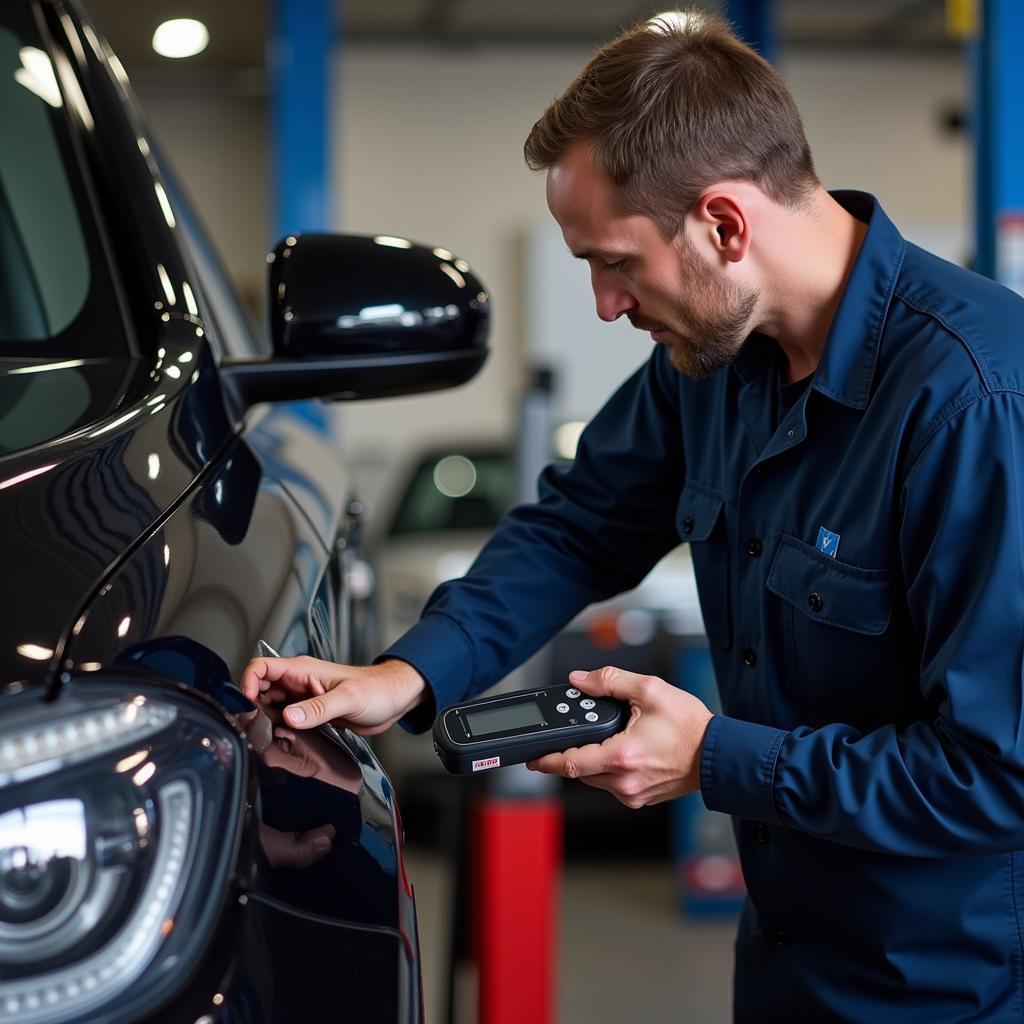Choosing the best car diagnostic scanner in the UK can feel overwhelming with countless options available. Whether you’re a seasoned mechanic or a car enthusiast looking for DIY solutions, a reliable diagnostic scanner is crucial. This guide cuts through the noise, providing everything you need to know to make an informed decision.
Why Invest in a Car Diagnostic Scanner?
Gone are the days of relying solely on mechanics for car trouble. A diagnostic scanner empowers you to:
- Diagnose engine problems: Identify issues like misfires, poor fuel economy, or check engine lights.
- Read and clear fault codes: Understand the severity of problems and reset warning lights after repairs.
- Monitor live data: Analyze real-time engine parameters like temperature, pressure, and oxygen sensor readings.
- Perform special functions: Depending on the model, you can access functions like ABS bleeding, airbag system resets, and more.
Types of Car Diagnostic Scanners:
Navigating the world of car diagnostic scanners starts with understanding the different types available:
1. OBD-II Code Readers:
These entry-level scanners are budget-friendly and perfect for reading and clearing basic engine fault codes. They are ideal for car owners who want to understand their check engine light and perform simple diagnostics.
2. Bluetooth Scanners:
Connect wirelessly to your smartphone or tablet, offering convenience and portability. These scanners provide a user-friendly interface and often come with mobile apps for enhanced functionality.
3. Professional-Grade Scanners:
Designed for mechanics and experienced users, these scanners offer advanced features such as bi-directional control, coding, programming, and comprehensive system coverage. They provide in-depth analysis for complex repairs.
Key Features to Consider:
Before making your purchase, consider these crucial features:
- Vehicle Coverage: Ensure the scanner is compatible with your car make, model, and year. Some scanners specialize in specific manufacturers, while others offer broader coverage.
- Functionality: Determine the level of detail and control you need. Consider features like live data streaming, bi-directional control, and special functions.
- User Interface: Opt for a scanner with a clear, intuitive interface and easy-to-understand menus.
- Software Updates: Regular updates ensure compatibility with the latest vehicle models and diagnostic protocols.
- Budget: Set a realistic budget and choose a scanner that offers the best value for your needs.
Top Car Diagnostic Scanners in the UK:
To simplify your search, here are some of the top-rated car diagnostic scanners available in the UK:
- Autel MaxiCOM MK808: This professional-grade scanner offers extensive vehicle coverage, advanced functions, and a user-friendly touchscreen interface.
- Launch CRP129X: A versatile scanner with a wide range of features, including full OBD-II functionality, four system diagnoses, and live data streaming.
- BlueDriver Professional OBD2 Bluetooth Scanner: This compact scanner connects to your smartphone, providing detailed diagnostic reports and live data graphs through a user-friendly app.
Tips for Choosing the Right Scanner:
- Define your needs: Consider your skill level, the types of repairs you perform, and your budget.
- Read reviews: Check online reviews and compare features, performance, and user experiences.
- Seek expert advice: Consult with mechanics or automotive specialists to get personalized recommendations.
- Consider future needs: Invest in a scanner that can accommodate your future diagnostic requirements.
 Mechanic Diagnosing Car with a Scanner
Mechanic Diagnosing Car with a Scanner
Conclusion:
Investing in the best car diagnostic scanner in the UK is a smart move for both car owners and professionals. By understanding your needs and exploring the available options, you can find the perfect scanner to empower you with vehicle diagnostics. Remember, having the right tools can save you time, money, and unnecessary headaches on the road.
FAQs:
1. What is the difference between OBD-I and OBD-II scanners?
OBD-I scanners are older and specific to certain car makes and models. OBD-II scanners are standardized and work with most vehicles manufactured after 1996.
2. Can I use a diagnostic scanner on any car?
Most modern scanners offer wide vehicle compatibility, but it’s essential to check the manufacturer’s specifications to ensure compatibility with your specific car make, model, and year.
3. Do I need a professional-grade scanner for DIY repairs?
For basic diagnostics and repairs, a code reader or Bluetooth scanner might suffice. However, if you plan on performing advanced repairs, a professional-grade scanner is recommended.
4. How often should I update my scanner software?
Regular software updates are crucial to ensure compatibility with the latest vehicle models and diagnostic protocols. Check the manufacturer’s website for updates and instructions.
5. Can a diagnostic scanner fix car problems?
While a scanner can identify issues and provide fault codes, it cannot fix the problems. You’ll need to address the underlying mechanical or electrical issues to resolve them.
6. What are some of the best car diagnostic software for laptop use?
You can explore options like the best car diagnostic software for laptop, which can offer advanced features and data analysis capabilities.
7. Are there specific diagnostic tools for laptop use in the UK?
Yes, there are options like the best car diagnostic software laptop uk cable that cater specifically to the UK market and vehicle specifications.
Need help choosing the perfect car diagnostic scanner? Contact us via WhatsApp at +1(641)206-8880 or email us at [email protected]. Our 24/7 customer support team is here to assist you. You can also find more information and resources on our website, including articles about the best car diagnostic software laptop and the best laptop for car diagnostics.

Leave a Reply